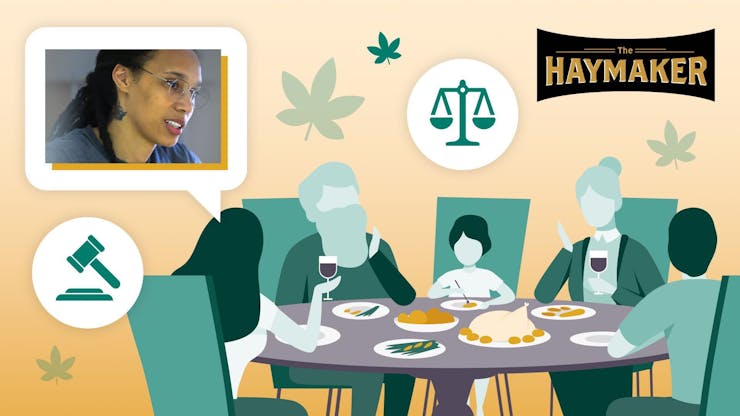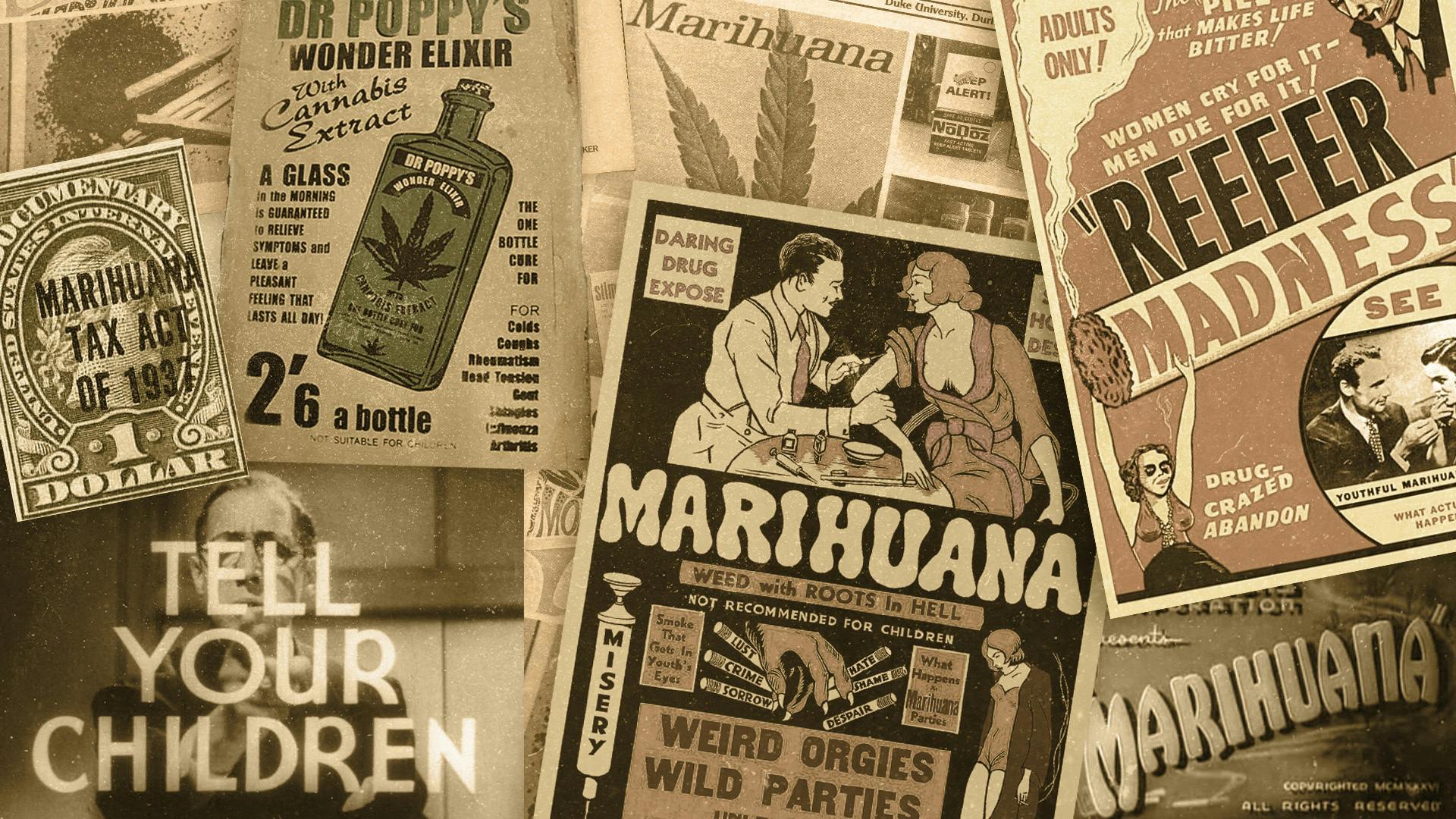The Haymaker is Leafly Senior Editor Bruce Barcott’s opinion column about cannabis politics and culture.
It’s the holiday season, and that means you’re going to be interacting with family members you may have successfully avoided for the past eleven months. Why not dazzle them with some weed talk?
Why not dazzle your grandma and uncles with a little risqué weed talk?
I’m serious. The last thing any of us needs is a kitchen counter debate about Joe Biden and the price of gas. I’ll let you in on a secret: Your liberal pearl-clutching grandma and your MAGA uncle get a little thrill when you roll out the cannabis conversation. It’s risqué, it’s cool, and you’re offering them information they can later lay down before their fuddy-duddy friends like an ace-high straight.
This year you’ve got a hot talking point: Brittney Griner.
Yesterday’s release of the WNBA superstar—in a prisoner swap that sent a notorious arms dealer to Russia—made global headlines. Your relatives will surely have heard of her. They may open with an insulting reference to “that girl” (Griner is a grown 32-year-old adult) or some sort of sneering anti-woke nonsense.
Ignore the bait. Treat it like an errant whiff of flatulence and allow it to pass unremarked. Instead, step up with a bright scene-setter.
“Oh! I’m so glad you brought her up,” you can say. “That’s such a fascinating case.”
Welcome to my Ted Talk
You can go anywhere from here. My choice would be this: “Isn’t it crazy to think about a global superpower trading a murderous arms dealer for a professional athlete who happened to be traveling with a vape pen?”
“I’m breaking federal law, Uncle Truck. Should I go to prison for ten years?”
At this point, your uncle with the big truck might respond: “She knew the rules. She broke the law. She smuggled drugs into Russia.”
That’s your cue to slowly, dramatically, withdraw your own cannabis vape pen from a pocket and display it for all to see.
“I know the rules, Uncle Truck. I’m breaking federal law right now. Should I go to prison for ten years?”
Emphasize your point by hitting the vape. Offer Uncle Truck a pull.
You have the information they desire
“Here’s what I think,” you continue. “I think we’ve been told so many lies about marijuana for so many years that we tend to assume anyone who enjoys it must be a bad person. But I’ve learned that’s simply not true. Millions of people use cannabis for millions of different reasons. Some people use it for relief from chronic pain, because it’s safer and more effective than opioids. Some people use it to help them sleep, or to relieve their anxiety. Some people use it to relax and laugh and enjoy themselves, and that’s okay too.”
“Nearly half of all Americans now live in a state that has legalized marijuana. Regulating it really seems to be working, and we don’t have to arrest people for possessing a substance that’s far less harmful than alcohol.”
Handling the ‘gateway’ question
Grandma wants to speak. She is concerned that marijuana is a “gateway drug,” leading to the use of more harmful substances. And she’s worried about “the message we’re sending to children” by legalizing weed.
Respect the questioner. “Those are worthy concerns,” you say. “Which is why researchers have studied them quite a lot. What they found is that marijuana is, in fact, not a ‘gateway drug.’ It does not lead a person to seek stronger and stronger doses of anything. Think about your own experience. Did the stimulation of coffee lead you to seek out crystal meth?”
Shop highly rated dispensaries near you
Showing you dispensaries near“The message we’re sending to children is this: We’ve learned more about cannabis, and what we’ve learned is that it’s appropriate for some adults but not for children. We have age limits on many substances and activities. We don’t let six-year-olds drive the family car. We keep alcohol off-limits until you’re 21. It’s every parent’s responsibility to talk with their kids about these rules and why they’re important. In fact, we now have years of data showing that underage marijuana use has not increased in states that have legalized and regulated.”
This is what it’s like to live legally
Uncle Truck wants to bring it back to Brittney Griner. “Stupid is as stupid does,” he says. “And that girl was stupid if she thought she was going to get away with bringing her weed into Russia.”
“Oh Uncle Truck,” you say, chuckling. “Bless your heart.” Gently remind him that Ms. Griner is not a girl but a 6-foot-9, 205 pound, 32-year-old professional athlete who could fold him in half if she chose to do so.
“Here’s the thing with legal marijuana,” you can say. “When you live in a legal state, it’s easy to forget that other states and nations still treat weed like it’s heroin. I often keep a vape pen and a couple edibles in my toiletries kit and sometimes I forget they’re there. I suspect that’s what happened to Brittney Griner. She lived in Arizona, a legal state, and many pro athletesuse cannabis in moderate doses to sleep or to help their bodies recover.”
Pose this fun question to the group: “Who here has been stopped at TSA for a bottle of water in their carry-on?” Show of hands. “How about a pocket knife, scissors, or Leatherman tool?” (Give Uncle an eyebrow raise.) “That’s what it’s like for an adult cannabis consumer who lives in a legal state. It’s an honest mistake. It happens. Brittney Griner’s misfortune was that it happened at the Moscow airport.”
Use your power to speak freely
Rise to help clear the dishes from dinner. “Now, as for me,” you can say, “I’m going to enjoy a puff from my little friend here before dessert. And I invite any of the grownups who’d like to try it to join me on the porch.”
If you have the privilege to speak freely about cannabis, do so. There are millions of Americans who can’t because they risk losing their jobs, being locked up, or having their children taken by the state.
Openness is an antidote to stigma and shame. Speaking comfortably about cannabis is a powerful way to demolish the false assumptions that prop up cruel laws like the one that sent Brittney Griner to a Russian prison. Those same laws exist in the United States, too. Changing them requires opening minds and changing votes—and that process starts with a simple conversation at the dinner table.





